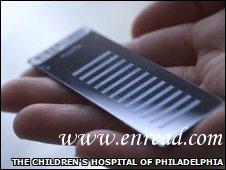Genes 'have key role in autism' 基因“对孤独症有关键性作用”
(单词翻译:单击)
Scientists have produced the most compelling evidence to date that genetics play a key role in autism.
科学家已经发现强有力的证据证明基因对孤独症起关键性作用。
Autism is more often diagnosed in boys
They highlighted tiny genetic2 changes that appear to have a strong impact on the likelihood(可能性) of developing autism(孤独症) and related conditions.
The changes influence genes3 which help form and maintain connections between brain cells.
The Nature study highlighted one common genetic variant4(遗传性变形) in particular which, if fixed5 would cut cases of autism by 15%.
Previously6, other genetic variants7 have been linked to autism, but they are all relatively8 rare.
Dr Raynard Kington, of the US National Institutes of Health, which funded the research, said: "These findings establish that genetic factors play a strong role in autism spectrum9(光谱,范围) disorder10 (ASD).
"Detailed11 analysis of the genes and how they affect brain development is likely to yield better strategies for diagnosing and treating children with autism."
People with ASD, which include autism and Asperger's syndrome12(综合症), have problems with social interaction, poor communication skills and tend to engage in repetitive behaviours.
In the latest studies researchers scanned the human genome for small differences between people who have an ASD, and those who do not.
The largest study, led by the University of Pennsylvania, focused on more than 10,000 people.
A bead13 chip used to analyse human DNA14 en masse
Sticky cells
It found several genetic variants commonly associated with ASD, all of them pointing two specific genes found on chromosome15(染色体) 5 which control production of proteins which help cells stick to each other, and make nervous connections.
One variant(变体), linked to a gene1 called CDH10, was so common - present in over 65% of cases of autism - that the researchers calculated that fixing it would cut the number of autism cases by 15%.
They also linked ASD rather less strongly to a group of about 30 genes which produce proteins that play a key role in enabling brain cells to migrate to correct places, and to connect to neighbouring cells.
Other genetic changes pinpointed16(精确地找到) by the Pennsylvania team occurred in genes involved in a cellular17(细胞的) waste system which probably ensures these "adhesion(附着,粘着)" proteins are kept in working order.
Lead researcher Dr Hakon Hakonarson said the genetics of ASD was likely to be complex.
He said: "Because other autism researchers have made intriguing18(吸引人的,有趣的) suggestions that autism arises from abnormal connections among brain cells during early development, it is very compelling to find evidence that mutations(变化,转变) in genes involved in brain interconnections increase a child's risk of autism."
But he added: "There are going to be many genes involved in causing autism.
"In most cases, it's likely that each gene contributes a small amount of risk, and interacts with other genes and environmental factors to trigger the onset19(攻击,进攻) of disease."
Similar findings were reported in separate studies published in Annals of Human Genetics and Molecular20 Psychiatry21.
Science 'accelerating'
Professor Simon Baron-Cohen, an autism expert at the University of Cambridge, said 133 genes had now been linked to the condition, and much work was needed to piece together how they interacted with each other and the environment.
He said: "The puzzle is slowly being pieced together, and the science of autism is accelerating in promising22 ways."
The National Autistic Society said the exact causes of autism were unknown.
In a statement, the society said: "There is evidence to suggest that genetic factors are responsible for some forms of autism.
"However, the difficulty of establishing gene involvement is compounded by the interaction of genes and by their interaction with environmental factors.
"Various studies over many years have sought to identify candidate genes but so far inconclusively."
 收听单词发音
收听单词发音
1
gene

|
|
| n.遗传因子,基因 | |
参考例句: |
|
|
|
2
genetic

|
|
| adj.遗传的,遗传学的 | |
参考例句: |
|
|
|
3
genes

|
|
| n.基因( gene的名词复数 ) | |
参考例句: |
|
|
|
4
variant

|
|
| adj.不同的,变异的;n.变体,异体 | |
参考例句: |
|
|
|
5
fixed

|
|
| adj.固定的,不变的,准备好的;(计算机)固定的 | |
参考例句: |
|
|
|
6
previously

|
|
| adv.以前,先前(地) | |
参考例句: |
|
|
|
7
variants

|
|
| n.变体( variant的名词复数 );变种;变型;(词等的)变体 | |
参考例句: |
|
|
|
8
relatively

|
|
| adv.比较...地,相对地 | |
参考例句: |
|
|
|
9
spectrum

|
|
| n.谱,光谱,频谱;范围,幅度,系列 | |
参考例句: |
|
|
|
10
disorder

|
|
| n.紊乱,混乱;骚动,骚乱;疾病,失调 | |
参考例句: |
|
|
|
11
detailed

|
|
| adj.详细的,详尽的,极注意细节的,完全的 | |
参考例句: |
|
|
|
12
syndrome

|
|
| n.综合病症;并存特性 | |
参考例句: |
|
|
|
13
bead

|
|
| n.念珠;(pl.)珠子项链;水珠 | |
参考例句: |
|
|
|
14
DNA

|
|
| (缩)deoxyribonucleic acid 脱氧核糖核酸 | |
参考例句: |
|
|
|
15
chromosome

|
|
| n.染色体 | |
参考例句: |
|
|
|
16
pinpointed

|
|
| 准确地找出或描述( pinpoint的过去式和过去分词 ); 为…准确定位 | |
参考例句: |
|
|
|
17
cellular

|
|
| adj.移动的;细胞的,由细胞组成的 | |
参考例句: |
|
|
|
18
intriguing

|
|
| adj.有趣的;迷人的v.搞阴谋诡计(intrigue的现在分词);激起…的好奇心 | |
参考例句: |
|
|
|
19
onset

|
|
| n.进攻,袭击,开始,突然开始 | |
参考例句: |
|
|
|
20
molecular

|
|
| adj.分子的;克分子的 | |
参考例句: |
|
|
|
21
psychiatry

|
|
| n.精神病学,精神病疗法 | |
参考例句: |
|
|
|
22
promising

|
|
| adj.有希望的,有前途的 | |
参考例句: |
|
|
|
- 上一篇:Telescopes flight given 'go' date 天文望远镜确定“升空”日期
- 下一篇:Debut for world's fastest camera 世界速度最快的相机登场






